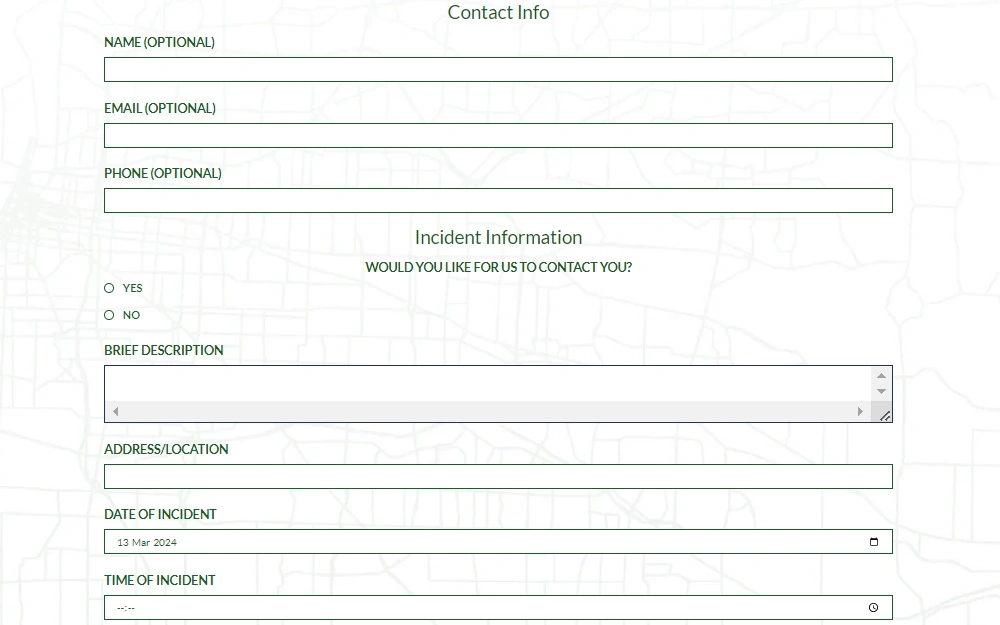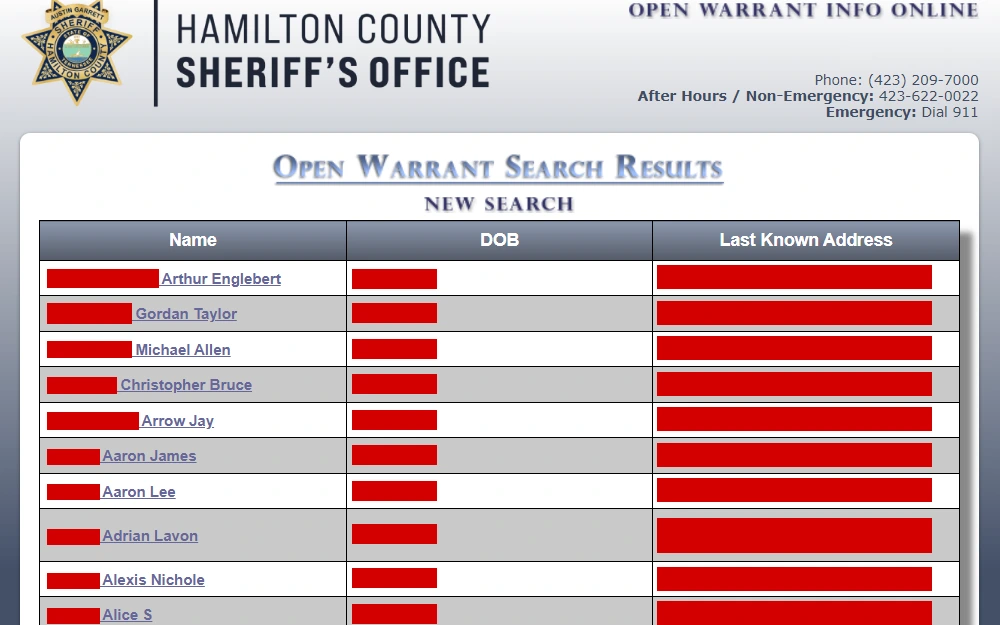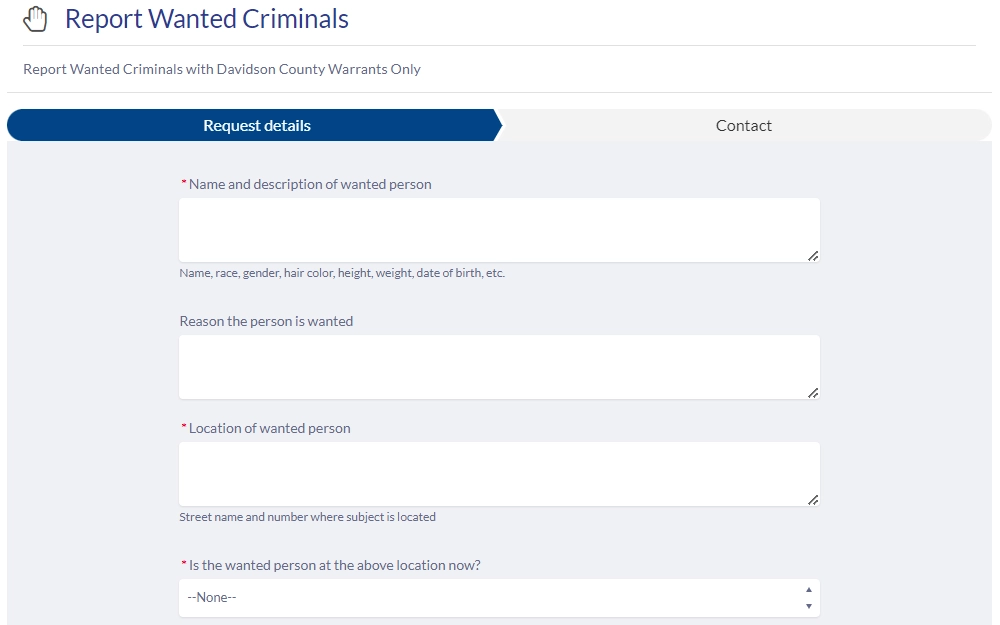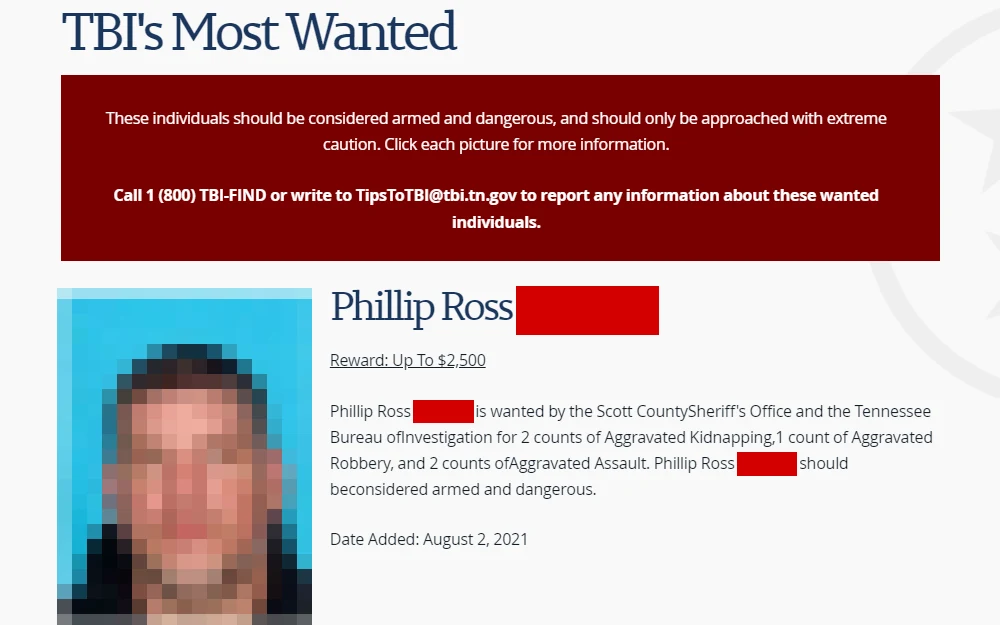Perform a free Tennessee warrant search right away to reveal if you or a loved one is wanted by law enforcement.
Details of wanted individuals are available for public viewing or request, thanks to state and federal public records laws. Because active warrants can be executed at any time, it’s important to deal with them promptly.
Records of active warrants can be located online at no cost, allowing people to identify and resolve them before they’re enacted; this resource provides links to helpful search tools, contact information for record custodians, and streamlined guidance on how to track down these records.
The Availability of Warrant Records in Tennessee
In accordance with the Tennessee Public Records Act, warrants are typically accessible to the general public.1 This act allows individuals to access state, county and municipal public records, including most warrants and arrest and criminal records.
Many of these records can be accessed online at the county level, but others may require a phone call or written request. Some warrants, if active, may be exempt from reporting if they interfere with law enforcement’s ability to execute them.
Because there’s no statewide central department for public records in Tennessee, individuals will have to file requests with the specific department holding the documents they wish to inspect.
Each governmental entity will have a policy for accepting and responding to requests, as well as any fees that may be incurred and the name or title of the Public Record Request Coordinator (PRRC). The PRRC will be able to assist with locating and procuring requested records.
A Look at Searching for Warrants in TN
A warrant search can be conducted with the right information. Typically, it’s required to know the person’s first and last name and where the warrant was issued. It can also be helpful to know an individual’s birth date and address to help streamline the search process.
Multiple agencies may have information pertaining to warrants in Tennessee, and several offer this online, often at no cost. Selecting the right agency for the search depends on the type of warrant and the location where the offense occurred. It’s typically easiest to begin with a broader scope and narrow it down with further searches.
Warrants may be overseen by federal, state, county or municipal courts, though there’s no statewide warrant search tool offered by the Tennessee government. Warrants may be issued for many reasons and can exist in several forms. However, most of them are likely to appear through the same avenues of research.
How To Run a Tennessee Warrant Search on Yourself or Someone Else
While there is no statewide warrant search tool, it’s possible to run a warrant search on yourself or someone else through the Open Record Background Checks Information Services program, hosted by the state’s Bureau of Investigation (TBI) in the form of a criminal background check.2
It costs $29 to access the information, and prior to receiving it, requestors must provide their legal name, street address, phone and email address.
Once you’ve entered your information and agreed to the $29 charge, you can begin your search. It’s important to fill in as much information as possible to guarantee accurate results, but at a bare minimum, it’s necessary to enter a first and last name, city, state, zip code, birthday, race and sex.
There are also slots to enter a full street address, Social Security number and aliases the individual is known to use. You may select to have the information notarized, though this may delay results by a week.
The background check can also be requested via mail sent to:
Tennessee Bureau of Investigation – TORIS Unit
901 R.S. Gass Boulevard
Nashville, TN 37216
Phone: (615)744-4057
To mail in the request, access the paper form (available in English and Spanish) on the TBI website, print it, fill it out and send it.3 The paper form asks for similar information as the online version, with additional spaces for payment method (card, cashier’s check or money order), how the requestor wishes to receive the results and where the results should be sent.
Some warrants are readily available on the internet, including a list of the most wanted fugitives in the state. However, most warrants are available at the county or municipal level.
At the county level, warrants are typically held by sheriff’s offices. To give some examples of how to track down warrants at this level, below you’ll find contact information and warrant details for some of Tennessee’s most populous counties.
Warrants held by the Shelby County Sheriff’s Office can be located through its Warrant Information System. This online database requires a first and last name to be entered, at which point it reveals a list of active warrants, as well as an address and other identifying information and the charges they’re wanted for.

If you discover yourself on this database, it’s recommended that you contact the sheriff’s department directly or show up in person to handle it. Remember that if you show up in person and a warrant for your arrest is found, they’ll likely take you into custody immediately.
If you have information about someone who currently has an outstanding warrant, you may report it to the Shelby County Sheriff’s Office through the online Warrant Tip tool.5
Shelby County Sheriff’s Office
201 Poplar Avenue, 9th Floor
Memphis, TN 38103
Phone: (901)222-5500

Though the Davidson County Sheriff’s Office doesn’t have an online warrant lookup, it’s possible to contact them directly to determine an individual’s status. If you know the location of someone with an outstanding warrant, you can also make reports online, including information such as their name and description, where they’re located and other information about them.6
Davidson County Sheriff’s Office
506 2nd Avenue North
Nashville, TN 37201
Phone: (615)862-8123
There’s no online form to look up warrants for Knox County, but you may request warrants from the sheriff’s department via phone or in person. It’s also possible to submit tips on people with outstanding warrants through their online tip form.7
Knox County Sheriff’s Department
7326 Norris Freeway
Knoxville, TN 37918
Phone: (865)922-1070
The Hamilton County Sheriff’s Office maintains an Open Warrant Information Online Tool, allowing individuals to search for warrants issued after January 1, 2008 by name.8 It’s also possible to browse the entire list of those with active warrants by selecting “Browse Full List.”
Hamilton County Sheriff’s Office
600 Market Street
Chattanooga, TN 37402
Phone: (423)209-7000
Fax: (423)209-7001

Contacting the Warrants & Records Division of the Rutherford County Sheriff’s Office may reveal warrants. However, they don’t have an online database, so requests must be made in person or via email. If you have information about a crime that has occurred, you can also complete the Submit a Tip form.
Rutherford County Sheriff’s Office
940 New Salem Highway
Murfreesboro, TN 37129
Phone: (615)898-7877
Email: [email protected]
Check With Municipal Courts & Law Enforcement Agencies in Tennessee for Warrant Information
Municipal courts and law enforcement agencies may also provide warrant information. The locations below provide information about warrants in some of the most populous cities and municipalities in Tennessee.
The Nashville Police Department can provide information about warrants, but it only conducts business in person, per its website. It’s possible to report wanted criminals online, but to discuss whether you have an active warrant, you’ll have to present yourself to the police department, potentially risking arrest if one is found.6
Nashville Police Criminal Warrants Office
440 3rd Avenue North
Nashville, TN 37201
Phone: (615)862-7685

In Knoxville, the county sheriff’s department handles warrants. As previously stated, warrants can’t be searched online, but the department can assist in locating records in person or over the phone.
Knox County Sheriff’s Department
7326 Norris Freeway
Knoxville, TN 37918
Phone: (865)922-1070
The Chattanooga City Court Clerk can assist with records pertaining to potential warrants in person. However, outside of an online court docket and record search, there’s no dedicated warrant search provided for this particular municipality.10 It must be done at the county level.
Chattanooga City Court Clerk
600 Market Street, Room 104
Chattanooga, TN 37402
Phone: (423)643-6311
Fax: (423)643-7587
Locate Federal Warrants Issued in TN or Elsewhere in the U.S.
Federal warrants aren’t as common as municipal or state warrants. However, it can still be useful to know how to navigate them.
In particular, you can search the Federal Bureau of Investigation (FBI), U.S. Drug Enforcement Administration (DEA) and U.S. Marshals Service to identify people wanted on federal warrants. If you recognize anyone on these pages, you can send tips to help locate them.
Another way to discover federal warrants issued throughout the nation is through the Public Access to Court Electronic Records (PACER). Using this tool, it’s possible to search for a case online. This is done by searching for an individual’s name, clicking on Case Number and then choosing Docket Sheet, Docket Report or History/Documents.
However, PACER isn’t a free resource, and the prices for records will vary based on the number of pages provided.11
Perhaps the easiest option is to contact an attorney well-versed in Freedom of Information Act (FOIA) requests. They may be able to assist with putting through a request to the U.S. Marshals Service. The U.S. Marshals Service is responsible for executing federal warrants and, therefore would have access to any in your name. Any FOIA requests may accrue fees, depending on the types of files, the number of pages and other factors.12
Different Types of Warrants in Tennessee & What Each Means
A warrant search can reveal numerous types of court orders, all issued for different reasons. Warrants are legal documents that a judge provides authorizing law enforcement to take action based on the type of warrant it is. This can include arresting the named individual and searching or seizing property. When a warrant can be carried out, it’s called an active warrant.
Warrants don’t expire over time, so if you discover that you or someone you know has one, it’s important to handle it promptly. The following are some of the most common warrants written, but others also exist.
- Arrest Warrants: Arrest warrants are written orders signed by a judge to grant permission to the police to take an individual into custody. They’re issued when a court has a reasonable belief that an individual has committed a crime.
- Child Support Warrants: Parents who fail to comply with child support orders and fall behind may be issued a warrant for their arrest if it’s found they refused to pay willingly.
- Fugitive Warrants: Fugitives are those who’ve fled the jurisdiction in which they were set to be prosecuted. A fugitive warrant allows for other jurisdictions to execute the warrant. It may be from another state or county.
- Bench Warrants: Bench warrants are issued granting the police permission to take an individual into custody after they’ve failed to appear in court when summoned.
- Probation & Parole Violation Warrants: This warrant is issued when a person has disobeyed the conditions of their probation or parole.
- Traffic Warrants: When someone fails to pay a traffic citation and fails to appear in court when summoned, it’s possible a judge will issue a traffic warrant. This warrant will allow police to arrest the individual with a warrant upon contact.
- Search Warrants: Search warrants grant permission for police officers to search for evidence in areas individuals typically have a right to refuse access to, such as a home or vehicle.
- Capias & Capias Pro Fine Warrants: A capias warrant is an order to arrest and detain an individual to ensure they appear in court. It’s typically issued when a defendant fails to appear for court when summoned.
If a judge issues a capias pro fine warrant, it’s because a defendant failed to follow a court order, such as paying a fine or restitution. While common in criminal cases, they may also be used in traffic, civil or family cases.
Addressing Warrants & Reporting Persons of Interest in Tennessee
If, while performing a warrant search, you discover that you or someone you know is wanted, there are certain actions you should take. If the wanted individual is a friend, family member or acquaintance and you feel safe talking to them about it, let them know so they can resolve it.
However, if the wanted person is dangerous or you worry about the safety of yourself, the wanted person or the general public, it may be appropriate to notify your local law enforcement tip line. Most municipal police stations have one or have a non-emergency helpline that can be called to report the individual’s whereabouts.
Statewide, you can contact Tennessee Bureau of Investigation Tips either by phone at 1-800-TBI-FIND (+1-800-824-3463) or by email at [email protected].13

If you discover that you have a warrant, there are three main courses of action you can take. Because warrants are serious and won’t expire over time, handling them promptly can prevent a surprise arrest during a traffic stop or other encounter with law enforcement that requires you to identify yourself.
You may be able to pay the fines associated with your warrant or get a court date scheduled to be heard by a judge. Some warrants are issued due to outstanding balances, and paying those can typically be enough to satisfy them.
Though not required, it’s strongly recommended to seek legal counsel before taking any action on a warrant. A lawyer will be able to guide you through the steps necessary to resolve the issue while minimizing the impact on your life. They may be able to help clear your name and assist in working out a payment plan to reduce the risk of further trouble, or they can defend you in court if necessary.
You can also turn yourself in when you discover you have a warrant for your arrest. However, before you do this, it’s a good idea to communicate with your family, a lawyer and a bail bondsman so you can have a plan to be released promptly to minimize the effect it will have on your day-to-day life.
Performing a Tennessee warrant search can help you manage any legal issues before they arise by allowing you to get ahead of the legal work and be prepared for what may happen next.
For further insight, you can also conduct a Tennessee arrest and criminal history search or look through all free public records in TN (such as details on probationers, parolees, court cases, marriages, divorces, and more).
References
1Tennessee Comptroller of the Treasury. (n.d.). Tennessee Public Records Act FAQs. Open Records Counsel. Retrieved March 12, 2024, from <https://comptroller.tn.gov/office-functions/open-records-counsel/open-meetings/frequently-asked-questions/tennessee-public-records-act-faqs.html>
2Tennessee Bureau of Investigation. (n.d.). Tennessee Open Records Information Services. Retrieved March 12, 2024, from <https://tbibackgrounds.tbi.tn.gov/Toris/>
3Tennessee Bureau of Investigation. (n.d.). Background Checks. Retrieved March 12, 2024, from <https://www.tn.gov/tbi/divisions/cjis-division/background-checks.html>
4Shelby County Sheriff’s Office. (2024). Warrant Tip Information. Warrant Information System. Retrieved March 12, 2024, from <https://warrants.shelby-sheriff.org/w_send_tip.php?w=22005566>
5Shelby County Sheriff’s Office. (n.d.). Submit a Tip. Warrant Information System. Retrieved March 12, 2024, from <https://www.shelby-sheriff.org/warrant-tip>
6Metropolitan Government of Nashville and Davidson County, Tennessee. (n.d.). Report Wanted Criminals. Retrieved March 12, 2024, from <https://hub.nashville.gov/s/request-type/a0ut0000002MxUcAAK/report-wanted-criminals?language=en_US>
7Knox County Sheriff’s Office. (n.d.). Submit a Tip. Retrieved March 12, 2024, from <https://knoxsheriff.org/submit-a-tip/>
8Hamilton County Sheriff’s Office. (2024). Open Warrant Information Online. Retrieved March 12, 2024, from <https://www.hcsheriff.gov/cid/owio/>
9Hamilton County Sheriff’s Office. (2024). Open Warrant Search Results. Retrieved March 12, 2024, from <https://www.hcsheriff.gov/cid/owio/search_results.php>
10Chattanooga City Court. (2024). Traffic/Criminal Case Search. Retrieved March 12, 2024, from <https://www.municipalrecordsearch.com/chattanoogatn/Cases>
11Administrative Office of the U.S. Courts. (2024). PACER Pricing: How fees work. Public Access to Court Electronic Records (PACER). Retrieved March 12, 2024, from <https://pacer.uscourts.gov/pacer-pricing-how-fees-work>
12United States Marshals Service. (n.d.). How to Submit a USMS FOIA Request. Retrieved March 12, 2024, from <https://foia.usmarshals.gov/app/RequestsandFees.aspx>
13Tennessee Bureau of Investigation. (n.d.). TBI Tips. Retrieved March 12, 2024, from <https://www.tn.gov/tbi/general-information/tbi-tips.html>
14Tennessee Bureau of Investigation. (2021, August 2). TBI’s Most Wanted. Retrieved March 12, 2024, from <https://www.tn.gov/content/tn/tbi/tbis-top-10-most-wanted.html>
